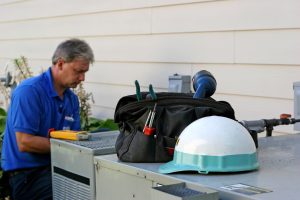As summer temperatures soar, our air conditioners (ACs) become our saving grace. But what happens when your trusty AC unit starts acting up? Ignoring minor issues can snowball into major repairs, leaving you hot, uncomfortable, and facing a hefty bill.
This blog post equips you with the knowledge to identify five common problems that require professional AC service in Conway. Early detection is key to preventing further damage and ensuring a cool and comfortable summer.
1. Weak or No Airflow:
Is your AC running, but the air coming out feels lukewarm or nonexistent? This could indicate several issues:
- Clogged Air Filter: A dirty air filter restricts airflow, reducing cooling efficiency. Check your filter monthly and replace it when clogged (typically every 1-3 months).
- Low Refrigerant Levels: Refrigerant is the lifeblood of an AC unit, absorbing heat from your home. Leaking refrigerant leads to insufficient cooling. Signs include hissing noises, ice buildup on the evaporator coil, and higher electricity bills.
- Frozen Coils: Restricted airflow can cause the evaporator coil to freeze. This hinders further cooling and can damage the compressor.
2. Unusual Noises:
Your AC shouldn’t sound like a symphony of clangs, rattles, or screeches. Unusual noises can signal various problems:
- Loose Parts: Worn or loose components within the unit can cause rattling or banging noises.
- Failing Fan Motor: A failing fan motor might cause a whining or grinding sound. This is crucial for proper airflow and needs professional attention.
- Compressor Issues: A failing compressor, the heart of the AC, might produce a clicking or grinding noise.
3. Leaks:
Water leaks around your AC unit are a red flag. They can indicate several issues:
- Clogged Drain Line: A clogged drain line prevents condensation from draining properly, leading to leaks.
- Damaged Drain Pan: A cracked or damaged drain pan can’t hold condensate, causing it to overflow and leak.
- Refrigerant Leak: As mentioned earlier, a refrigerant leak can manifest as water leaks around the unit.
4. Inconsistent Temperatures:
Is your home uncomfortably warm in some rooms and cool in others? This could be due to:
- Uneven Air Distribution: Blocked vents, closed doors, or an improperly sized AC unit can lead to uneven cooling.
- Malfunctioning Thermostat: A faulty thermostat might not accurately register room temperature, causing the AC to cycle on and off erratically.
5. Rising Electricity Bills:
A sudden spike in your electricity bill, despite no significant change in usage, could be a sign of an inefficient AC unit:
- Dirty Coils: Dirty condenser and evaporator coils reduce heat transfer efficiency, forcing the AC to work harder to maintain the desired temperature.
- Low Refrigerant Levels: As mentioned earlier, low refrigerant levels make the AC work harder to achieve cooling, leading to higher energy consumption.
Remember: The best way to avoid major AC repairs is through preventive maintenance. A qualified technician can inspect your unit, clean the coils, check refrigerant levels, and identify potential problems before they escalate.
Schedule service with the experts at Dewees HVAC for prompt and effective AC repairs.

